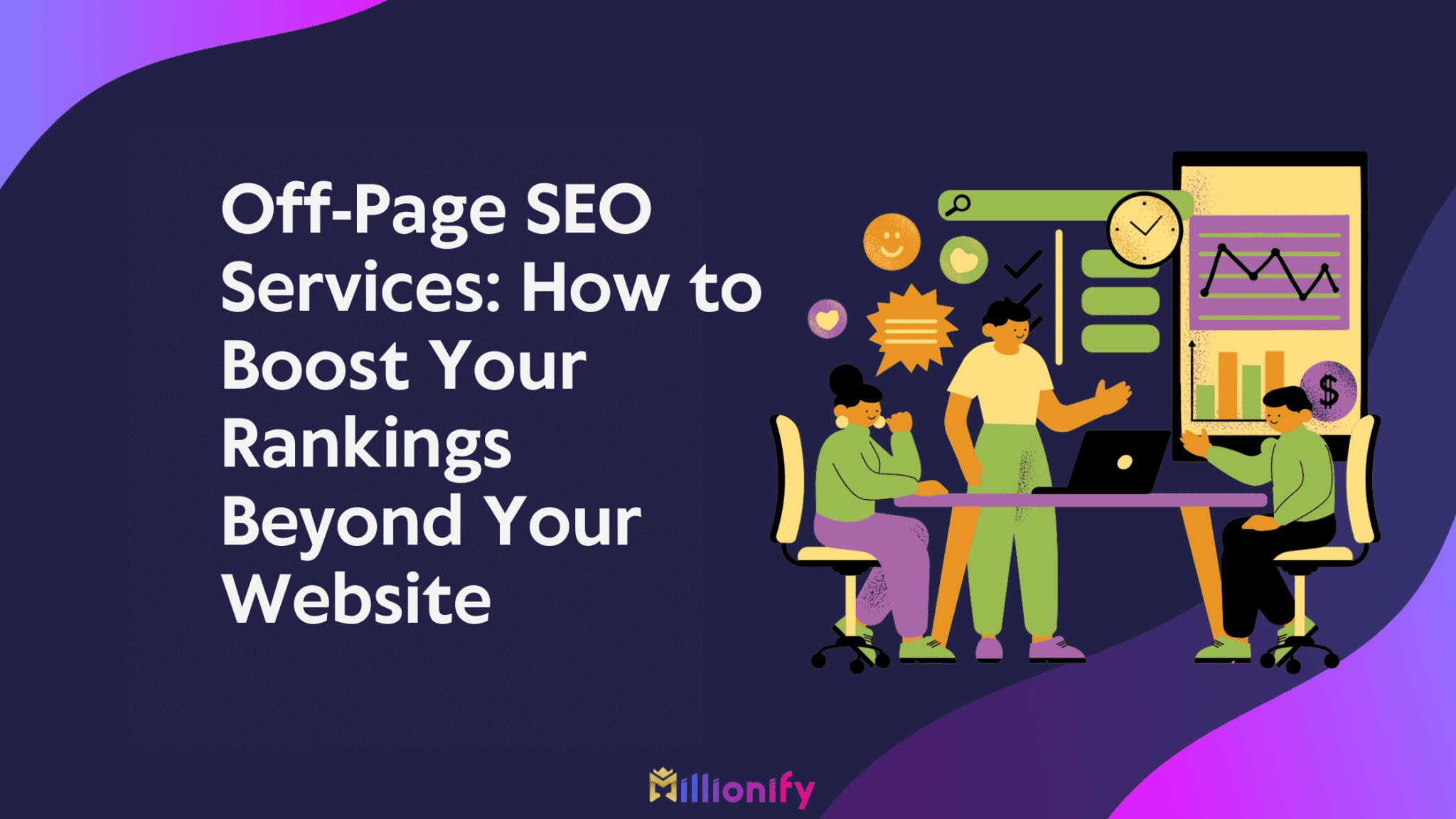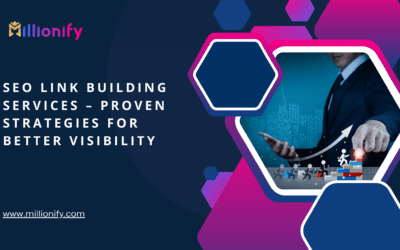Search Engine Optimization (SEO) has two main branches—on-page and off-page SEO. While on-page SEO focuses on optimizing the content and technical aspects of your website, off-page SEO goes beyond your site, building authority and credibility across the internet. The effectiveness of off-page SEO directly impacts your search engine rankings, making it a crucial piece of any digital marketing strategy.
What exactly is off-page SEO, and how does it help your site rank higher on Google and other search engines? Let’s dive into the importance of off-page SEO and the components that make it a game-changer for your online presence.
What is Off-Page SEO and Why is It Important?
Off-page SEO refers to the actions taken outside of your own website to impact your rankings on search engine results pages (SERPs). This includes everything from backlink building and social media signals to guest blogging and influencer outreach. While it doesn’t deal with the structure or content on your website, off-page SEO helps search engines understand how the rest of the internet perceives your site.
Think of it this way: If your website is a store, off-page SEO is the word-of-mouth advertising and reviews that bring in more customers. It’s about building trust and showing Google that your content is valuable, reliable, and worth showing to users.
The Role of Authority in Search Rankings
One of the main goals of off-page SEO is to build your site’s authority. Authority refers to how trustworthy and relevant a website is considered by search engines. Websites with higher authority rank better because they’re seen as more credible. Off-page SEO, particularly backlinking, plays a major role in increasing your authority, making it easier for your site to rank for competitive keywords.
The Components of Off-Page SEO
Let’s break down the core elements of off-page SEO to understand how they work together to boost your online presence.
1. Backlink Building
Backlinks are links from other websites that point to your own. They’re one of the most important factors in Google’s ranking algorithm. When high-authority websites link back to your content, it signals to Google that your website is trustworthy and authoritative.
Here’s why backlinks matter:
- Quality over Quantity: Having a few high-quality backlinks from authoritative sites is far more beneficial than having hundreds of low-quality ones.
- Anchor Text: The text used in the link pointing to your site (anchor text) also plays a role. Search engines analyze this text to understand the relevance of your content.
- DoFollow vs. NoFollow: Not all links pass the same weight. DoFollow links pass SEO authority to your site, while NoFollow links don’t, although they can still drive traffic.
2. Social Media Signals
Your social media presence can have an indirect impact on your SEO. Search engines don’t directly consider social media signals as a ranking factor, but strong engagement on platforms like Facebook, Twitter, and Instagram can lead to more traffic, brand mentions, and even backlinks.
- Social Sharing: When people share your content on social media, it increases the chances of earning backlinks.
- Brand Awareness: The more your brand is recognized and shared, the more trust search engines place in it.
- Driving Traffic: Social media can bring direct traffic to your website, signaling to search engines that your content is valuable.
3. Guest Blogging
Guest blogging is a way to reach a broader audience while gaining high-quality backlinks. Writing content for reputable websites in your industry allows you to:
- Reach New Audiences: Your content is exposed to a new group of readers who may not have known about your brand.
- Build Authority: Being published on respected platforms boosts your credibility and authority.
- Earn Backlinks: Most guest blogging opportunities offer a link back to your site, which is excellent for off-page SEO.
4. Influencer Outreach
Collaborating with influencers in your niche is another effective way to build links and drive traffic. Influencers have a large following and can amplify your brand message to thousands, even millions, of potential customers.
- Brand Mentions: Influencers often mention brands on their blogs or social media platforms, which can boost your online visibility.
- Trust and Credibility: When an influencer vouches for your brand, it adds a layer of trust that resonates with their audience.
- Content Collaboration: Partnering with influencers for content creation—such as blog posts, reviews, or social media takeovers—can help you build links and brand awareness.
How Off-Page SEO Builds Authority
Authority is like the backbone of off-page SEO. By earning quality backlinks, mentions, and social signals, your website gradually builds a reputation as a reliable and trustworthy source. Here are the key ways off-page SEO enhances your site’s authority:
1. Increasing Domain Authority (DA)
Domain Authority (DA) is a score that predicts how well a website will rank on search engine results pages. DA is calculated based on several factors, but backlinking and brand mentions are crucial.
- High-Quality Backlinks: Each time a credible website links to yours, it increases your DA.
- Consistent Efforts: Off-page SEO is not a one-time activity. Building authority takes time and requires consistent efforts, from guest blogging to earning mentions.
2. Brand Mentions
Whether on blogs, news articles, or social media, brand mentions contribute to off-page SEO. Even if these mentions don’t include a backlink, they can still boost your online visibility and trustworthiness in the eyes of search engines.
3. Enhanced Visibility
More mentions, shares, and backlinks mean more eyes on your content. This increased visibility strengthens your online presence, making it easier for people to find and engage with your brand.
Effective Backlink Strategies
Now that you understand the importance of backlinks, let’s explore some white-hat strategies for building them.
1. White-Hat Link Building
White-hat link building refers to ethical strategies for earning backlinks. These methods follow Google’s guidelines and focus on creating valuable content that naturally earns links.
- Content Creation: Writing high-quality, informative content is the best way to earn backlinks. The more valuable your content, the more likely people are to link to it.
- Linkable Assets: Create infographics, research studies, or comprehensive guides that others in your industry will want to link to.
2. Partnering with High-Authority Sites
Building relationships with authoritative websites can lead to mutual backlinking. These partnerships often involve content exchanges, guest blogging, or resource sharing.
3. Public Relations (PR)
Leveraging PR can also help in acquiring backlinks. By getting your brand featured in industry publications, news outlets, or influential blogs, you can earn quality links that contribute to off-page SEO.
Social Media’s Role in Off-Page SEO
While not a direct ranking factor, social media plays a significant role in amplifying your off-page SEO efforts. Here’s how:
- Content Sharing: The more your content is shared, the higher the chances of it being linked to by other websites.
- Brand Recognition: A strong social media presence increases brand recognition, which indirectly boosts your authority.
- Engagement: Engaging with users on social platforms builds trust and loyalty, encouraging them to visit and link to your site.
Tools & Metrics to Track Off-Page SEO
Tracking your off-page SEO efforts is crucial to understanding how well they are working. Here are some tools and metrics to monitor:
1. Domain Rating (DR)
Domain Rating (DR) is a metric developed by Ahrefs that shows the strength of your website’s backlink profile. The higher the DR, the more authoritative your site is considered.
| Metric | What It Measures |
|---|---|
| Domain Rating | Backlink profile strength |
| Citation Flow | Link quality |
| Trust Flow | Trustworthiness of linking sites |
2. Citation Flow & Trust Flow
Citation Flow measures the number of links pointing to your website, while Trust Flow measures the quality and trustworthiness of those links. A high Trust Flow combined with a high Citation Flow is the ideal scenario for strong off-page SEO.
Conclusion
Off-page SEO is an essential component of any successful SEO strategy. While it takes time and effort, building backlinks, earning social media signals, and establishing authority through guest blogging and influencer outreach can significantly boost your website’s rankings. By understanding how off-page SEO works and consistently applying these strategies, you’ll build a stronger, more authoritative online presence.
Looking to skyrocket your rankings? Let us handle the off-page SEO for you! Our comprehensive services include backlink building, influencer outreach, and more to ensure your site dominates the search results.
FAQs
1. What is the most important part of off-page SEO?
Backlink building is the most crucial part of off-page SEO, as it directly affects your website’s authority and rankings.
2. How long does it take to see results from off-page SEO?
Off-page SEO is a long-term strategy, and it can take anywhere from a few months to a year to see significant results.
3. Can social media help with off-page SEO?
Yes, while social media isn’t a direct ranking factor, it helps drive traffic, build brand recognition, and earn backlinks.
4. What are white-hat link-building strategies?
White-hat strategies include creating high-quality content, guest blogging, and building relationships with authoritative sites.
5. Do brand mentions without links help with SEO?
Yes, brand mentions without links can still contribute to your website’s authority and visibility.



